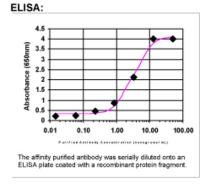Interferon beta (IFNB1) Rabbit Polyclonal Antibody
Frequently bought together (2)
beta Actin Mouse Monoclonal Antibody, Clone OTI1, Loading Control
USD 200.00
Other products for "Interferon beta"
Specifications
| Product Data | |
| Applications | ELISA |
| Recommended Dilution | WB: 1:5000-1:20000; ELISA: 1:100-1:2000; IHC: 1:10-1:2000; IHC-P 1:250-1:2000 |
| Reactivities | Human |
| Host | Rabbit |
| Isotype | IgG |
| Clonality | Polyclonal |
| Immunogen | DNA immunization. This antibody is specific for the entire range of the target protein. |
| Formulation | 20 mM Potassium Phosphate, 150 mM Sodium Chloride, pH 7.0 |
| Concentration | 1.24mg/ml |
| Purification | Purified from mouse ascites fluids or tissue culture supernatant by affinity chromatography (protein A/G) |
| Conjugation | Unconjugated |
| Storage | Store at -20°C as received. |
| Stability | Stable for 12 months from date of receipt. |
| Gene Name | interferon beta 1 |
| Database Link | |
| Background | The mammalian type I Inteferons (IFN1) are produced in response to viral infection and other inducers. They are divided into alpha and beta subtypes leukocytes and fibroblasts reactivity. The human IFN alphas are encoded by a family of at least 15 different genes, while IFN beta is the unique member of its subtype. There is approximately 50% amino acid homology between the alpha and beta subtypes. Both IFN subtypes are pleiotropic cytokines and have a similar range of biological activities. Differences between alpha subtypes, and between IFN alpha and betas, are in potency and cell type specific activities. In particular, IFN beta elicits a markedly higher antiproliferation response in some cell types such as, embryonal carcinoma, melanoma and melanocytes than do IFN alphas. Higher potency of IFN beta in treatment of multiple sclerosis and certain cancers has been observed. Type I IFNs signal through binding to a common cell surface receptor. Two chains of the receptor, IFNAR1 and IFNAR2, have been identified. Both chains are necessary for function and in the absence of either there is neither high affinity binding nor biological activity. The intracellular portions of the receptor subunits are bound by tyrosine kinases, Jak1 and Tyk2, members of the Janus kinase family. Upon ligand binding these kinases are activated and phosphorylate members of the STAT family of transcription factors, as well as IFNAR1 and 2. |
| Synonyms | IFB; IFF; IFNB |
| Note | This antibody was generated by SDIX's Genomic Antibody Technology ® (GAT). Learn about GAT |
| Reference Data | |
| Protein Families | Druggable Genome, Secreted Protein, Transmembrane |
| Protein Pathways | Cytokine-cytokine receptor interaction, Cytosolic DNA-sensing pathway, Jak-STAT signaling pathway, Natural killer cell mediated cytotoxicity, RIG-I-like receptor signaling pathway, Toll-like receptor signaling pathway |
Documents
| Product Manuals |
| FAQs |
| SDS |
{0} Product Review(s)
0 Product Review(s)
Submit review
Be the first one to submit a review
Product Citations
*Delivery time may vary from web posted schedule. Occasional delays may occur due to unforeseen
complexities in the preparation of your product. International customers may expect an additional 1-2 weeks
in shipping.






























































































































































































































































 Germany
Germany
 Japan
Japan
 United Kingdom
United Kingdom
 China
China



